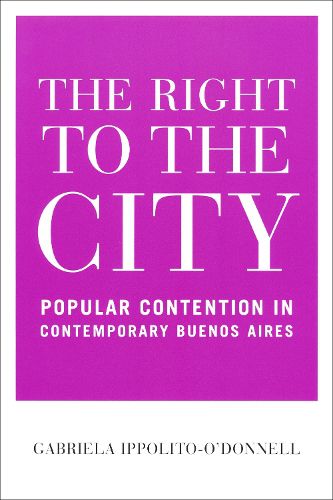Readings Newsletter
Become a Readings Member to make your shopping experience even easier.
Sign in or sign up for free!
You’re not far away from qualifying for FREE standard shipping within Australia
You’ve qualified for FREE standard shipping within Australia
The cart is loading…






Based on extensive, original fieldwork, as well as new survey data, The Right to the City contributes to the study of democratization by focusing on the dilemmas and opportunities of popular contention in the city of Buenos Aires. It also offers an excellent overview of the history of social mobilization in Argentina. Gabriela Ippolito-O'Donnell's main assertion in this study is that through various channels of collective action and associational activities, as well as by voting, the urban popular sector is a fundamental actor in the pursuit of the expansion and consolidation of citizenship rights. Using both qualitative analysis and quantitative data, Ippolito-O'Donnell explores what factors-economic, politico-institutional, organizational, and subjective-account for the emergence in the 1980s, and collapse in the 1990s, of a wave of grassroots popular organizations in Villa Lugano, a poor neighborhood located in the south of Buenos Aires. She identifies factors crucial for explaining the organizational weakness and concomitant cyclical patterns of collective action by the urban poor, as well as the consequences for alleviating poverty and inequality in this newly democratized nation.
$9.00 standard shipping within Australia
FREE standard shipping within Australia for orders over $100.00
Express & International shipping calculated at checkout
Based on extensive, original fieldwork, as well as new survey data, The Right to the City contributes to the study of democratization by focusing on the dilemmas and opportunities of popular contention in the city of Buenos Aires. It also offers an excellent overview of the history of social mobilization in Argentina. Gabriela Ippolito-O'Donnell's main assertion in this study is that through various channels of collective action and associational activities, as well as by voting, the urban popular sector is a fundamental actor in the pursuit of the expansion and consolidation of citizenship rights. Using both qualitative analysis and quantitative data, Ippolito-O'Donnell explores what factors-economic, politico-institutional, organizational, and subjective-account for the emergence in the 1980s, and collapse in the 1990s, of a wave of grassroots popular organizations in Villa Lugano, a poor neighborhood located in the south of Buenos Aires. She identifies factors crucial for explaining the organizational weakness and concomitant cyclical patterns of collective action by the urban poor, as well as the consequences for alleviating poverty and inequality in this newly democratized nation.